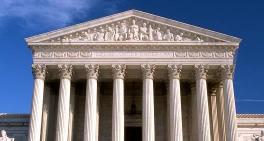Dems force 1-week delay on panel vote on Supreme Court pick
Practice Focuses
Senate Democrats on Monday forced a one-week delay in a committee vote on President Donald Trump's Supreme Court nominee, who remains on track for confirmation with solid Republican backing.
Sen. Chuck Grassley, R-Iowa, chairman of the Judiciary Committee, announced that, as expected, Democrats have requested a postponement. The committee vote on Judge Neil Gorsuch now will be held April 3.
As the committee readies to vote, three additional Democrats said they are likely to vote against the Denver-based appeals court judge. Florida Sen. Bill Nelson and Hawaii Sen. Mazie Hirono said they will vote against Gorsuch, and Vermont Sen. Patrick Leahy tweeted that he still was undecided but inclined to oppose him. Leahy is a senior member of the Judiciary panel and a former chairman.
That means at least 17 Democrats and independents, led by Minority Leader Chuck Schumer of New York, have announced their opposition to the Denver-based appeals court judge, arguing that Gorsuch has ruled too often against workers and in favor of corporations.
The Democrats who have announced their opposition have also said they will try to block the nominee, meaning Senate Majority Leader Mitch McConnell, R-Ky., will have to hold a procedural vote requiring 60 votes to move forward. The Senate GOP has a 52-48 majority, meaning McConnell will need support from at least eight Democrats or independents.
It was unclear whether he would be able to get the 60 votes. If he doesn't, McConnell seems ready to change Senate rules and confirm him with a simple majority.
Republicans had hoped that they'd see some support from the 10 Democrats running for re-election in states won by Trump in the presidential election, but four of those senators — Nelson, Pennsylvania Sen. Bob Casey, Ohio Sen. Sherrod Brown and Wisconsin Sen. Tammy Baldwin — have already said they will oppose the nominee.
Leahy, however, signaled that he may be willing to break from Schumer and vote with Republicans on the procedural vote, while also signaling in a separate tweet he'd vote against Gorsuch in the final, up or down vote.
Related listings
-
Federal judge throws out Texas voter ID law
Practice Focuses 08/23/2017A federal judge who has compared Texas' voter ID requirements to a "poll tax" on minorities once again blocked the law Wednesday, rejecting a weakened version backed by the Trump administration and dealing Texas Republicans another court defeat over ...
-
Top EU court moves to restore Hamas terror listing
Practice Focuses 07/23/2017The European Union’s top court ruled Wednesday that Islamic militant group Hamas should stay on the EU terror list, saying a lower court should not have ordered the group removed from the EU’s terror list, and sent the case back to the lo...
-
Connecticut court takes up doctor-patient confidentiality
Practice Focuses 06/23/2017The Connecticut Supreme Court will be deciding an issue that most people may think is already settled — whether medical providers have a duty to keep patients' medical records confidential.A trial court judge in Bridgeport, Richard Arnold, rule...

How do you qualify for workers compensation in Illinois?
The Workers’ Compensation Statute protects every employee in the State of Illinois.
A victim of a work-related injury or illness is eligible for many forms of compensation including reasonable medical care required to cure or relieve the impact of the injury, lost time from work, and any temporary or permanent disability.
Illinois Workers’ compensation is a system of benefits that:
– Pays for the medical treatment and medical bills incurred by work-related injuries and illnesses.
– Pays for the lost time from work
– Pays for any temporary or permanent disabilities
– Covers nearly every employee in Illinois
– and begins the very first day that you start working for your employer.
Employers in Illinois are required to purchase workers’ compensation insurance for their employees and the insurance companies fund the payment of worker’s compensation benefits for employees’ claims. In the event of a dispute, the Illinois Workers’ Compensation Commission (IWCC, or the Commission) enforces the state’s worker’s compensation laws and protects worker rights.




